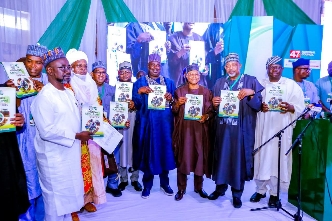The Federal Government has attributed the recent drop in food prices across Nigeria to its targeted market interventions, increased production, and sustained investment in the agricultural sector.
Minister of Agriculture and Food Security, Sen. Abubakar Kyari, made this known during the 47th Regular Meeting of the National Council on Agriculture and Food Security held in Kaduna on Thursday, November 6, 2025.
Kyari said ongoing reforms under President Bola Ahmed Tinubu’s administration aim to achieve food sovereignty — ensuring Nigeria produces what it consumes while guaranteeing accessibility, availability, and affordability for households.
“We are already beginning to witness a decline in food prices across several commodities, a reflection of ongoing targeted market interventions. While we are not yet where we want to be, this positive trend confirms that we are moving in the right direction,” he stated.
He explained that the Ministry, in collaboration with the African Development Bank and state governments, has strengthened the National Agricultural Growth Scheme–Agro-Pocket (NAGS-AP) as the flagship programme for input delivery and productivity expansion.
Kyari noted that wheat production has expanded from 15 states in the 2023/2024 dry season to more states in the 2024/2025 season. He added that Nigeria achieved a new milestone in October with the introduction of rainfed wheat cultivation in Kuru, Plateau State — an innovation by the Lake Chad Research Institute (LCRI) that extends wheat farming beyond irrigated zones.
“With rainfed varieties now viable in the highlands of Plateau, Taraba, and Cross River States, Nigeria is charting a new course toward all-year wheat farming and self-sufficiency,” he said.
The minister also highlighted efforts to reduce post-harvest losses through the Nigeria Postharvest Systems Transformation Programme (NiPHaST), developed in collaboration with the Alliance for a Green Revolution in Africa (AGRA).
He announced that the Bank of Agriculture has been approved for N1.5 trillion recapitalisation and an additional N250 billion financing window for smallholder farmers.
In partnership with Heifer Nigeria, a national agricultural mechanisation programme has also been launched to support youth- and women-led service centres across all six geopolitical zones.
Minister of State for Agriculture and Food Security, Sen. Dr. Aliyu Sabi Abdullahi, called for the adoption of climate-smart agriculture to enhance productivity and resilience. He cited flagship initiatives including the 500,000-hectare Dry Season Farming Scheme, renewable energy-powered irrigation systems, and the Every Home a Garden initiative led by First Lady Senator Oluremi Tinubu.
Declaring the Council open, Kaduna State Governor, Sen. Uba Sani, described the session as coming at a defining moment in Nigeria’s pursuit of food security.
“We face a dual imperative: to secure the food that nourishes our people and to build an agricultural economy that sustains our prosperity,” he said.
Governor Sani reaffirmed Kaduna’s commitment to aligning with the Federal Government’s agricultural vision through credit expansion, improved input delivery, modernized logistics, and agribusiness development.
Earlier, delegates visited De-Branch Farmers, the Afrexim Bank Quality Assurance Centre (under construction), Olam Agri, Tomato Jos, and TMDK Agro Park, where they observed innovations in value addition and rural job creation.
The event concluded with awards and recognitions for outstanding farmers and agricultural stakeholders.


